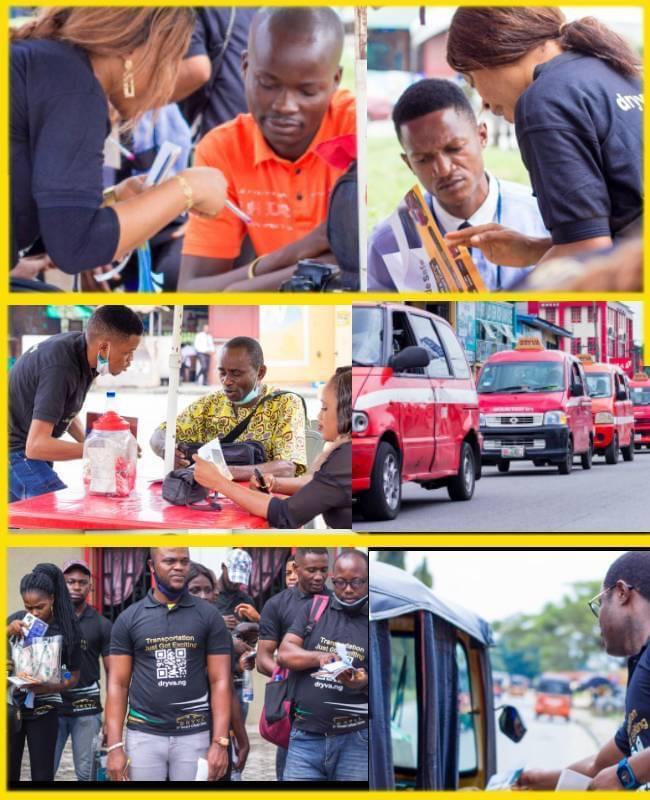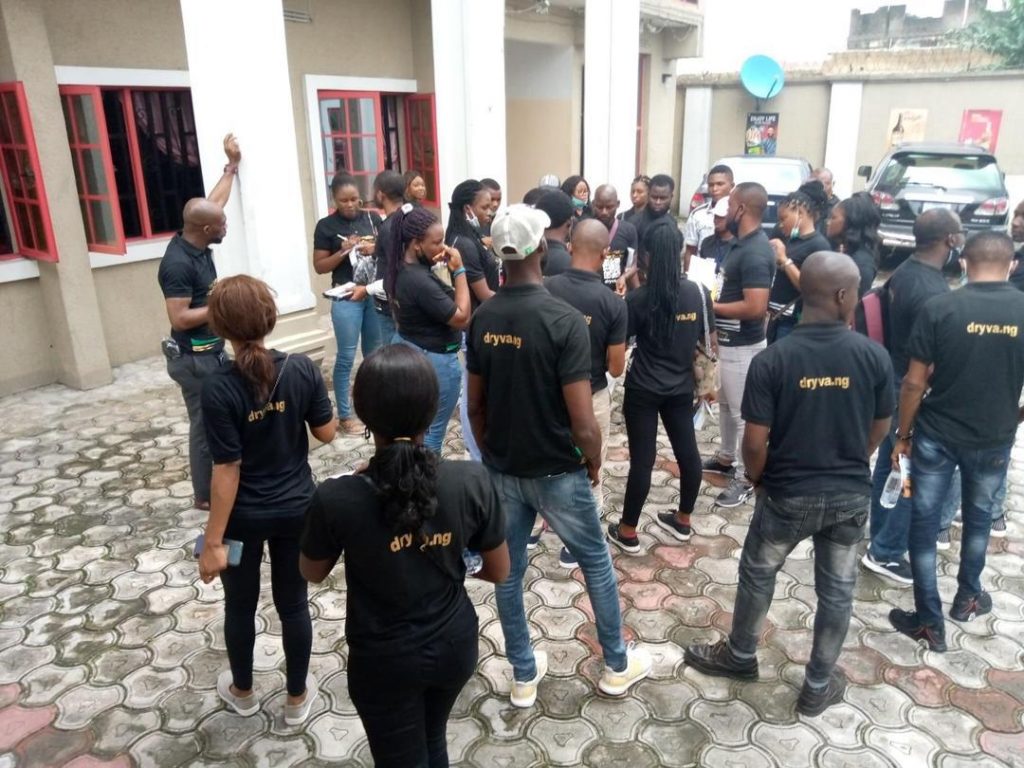Business
AKWA IBOM: HOW ENTREPRENEURS ARE DRIVING ECONOMIC DISRUPTION VIA FINTECH

MefLyN AnwanA
A large number of people use fintech solutions. If we check our phones and mobile gadgets for example, we will find one or two apps that we use regularly for finance-related transactions and activities.
According to Wikipedia, Financial technology (FinTech) is the technological innovation that aims to compete with traditional financial methods in the delivery of financial services. It is an emerging industry that uses technology to improve activities in finance. The use of smartphones for mobile banking, investing, credit service and cryptocurrency are examples of technologies aiming to make financial services more accessible to the general public. Financial technology companies comprise startups, established financial institutions and technology companies trying to replace or enhance the usage of financial services provided by existing players.
The outbreak of the COVID-19 pandemic has posed great challenges to economic activities and will have far-reaching consequences. On the other hand, crisis is also a strong driver of creativity and innovation. Indeed, if examined closely, one can already observe the results of creativity and innovation emerging at individual levels across the globe.
Public Transportation brings people into close contact in a confined space, increasing their risk of exposure to the virus. Interestingly, the Akwa Ibom State Government has issued public transport guidelines to operators and passengers to curb the spread of the Coronavirus. However, while the directives expect passenger spacing to be fully observed, passengers tend to have an increased risk of acquiring the virus, given their close contact with others. Moreover, cash payment, which is predominant amongst public transport users, tends to place passengers and drivers at high risk of contracting the virus easily – and further spreading it. Sincerely, it is tasking to practice social distancing amongst many transport users.
Framed against this backdrop, it is noteworthy to witness the emergence of companies proffering dynamic solutions via Fintech in the transport sector. One such startup is DRYVA, which is introducing an interesting Fintech model of combating the spread of covid-19 while enabling cheaper, faster and more convenient transportation. The company aims to bridge the urban needs of the transportation sector using smart technology that suits the Retailers market, and also provide cashless and very affordable fares, as well as effective security for customers to curtail social vices which are common in the urban mass transit transportation system. This system is bound to add immensely to the growth in the transportation sector.
Increasingly, entrepreneurs in Nigeria and Akwa Ibom state are deploying fintech solutions as strategies for scaling their businesses, delivering goods and services, and meeting the needs of clients. Some of them have integrated payment gateways and processors on their e-commerce websites and apps. A customer can shop for an item on a vendor’s site, make payment via Paystack or a flutter-wave gateway embedded on the platform, and receive the product via dispatch services. This synergy contributes to efficiency and reduces the hassles associated with handling cash.
Fintech solutions are indeed disrupting the way we do business.
Five months ago, as a result of the covid-19 pandemic, Facebook launched Facebook Shops, a platform on Facebook and Instagram for small business owners, big brands, and customers to make buying and selling easier with payments made using credit cards. Today, with shops currently locked in some states in the US due to the second wave of the pandemic, fintech solutions like Facebook Shops are helping users run their businesses effectively.
In today’s digital landscape, the adoption of FinTech is inevitable for financial institutions to stay competitive in the financial industry. Since their sudden appearance in the aftermath of the 2008 financial crisis, FinTech startups have been disrupting the financial scene by offering digitized financial services that are much more convenient for customers, compared to traditional banking. As a result, established monetary institutions will need to adapt and rebrand by leveraging the benefits that FinTech has provided.
In the course of the lockdown occasioned by the pandemic, there was an upsurge in the use of home delivery/dispatch riding services by businesses. Payments were made online and products were delivered to clients and customers offline. The new model of transportation of products from suppliers to end-users disrupted the conventional model of product pickups at shops and business premises which kept the economy afloat. With new delivery services companies springing up daily, new jobs are being created and services are being rendered.
Contrary to conservative opinions, the shift towards incorporating FinTech into business structures is anything but bad for the established banks, especially during a financial crisis. With the integration of FinTech, the financial services provided by banking enterprises, such as monetary transactions and insurance investments, will be further enhanced in terms of speed and accessibility to cater to the needs of customers. This in turn will allow enterprises gain customers’ trust and revenue growth, even during the economic crisis. As such, the emerging FinTech market has become more relevant during the post-covid-19 economy for its ability to re-engineer the business structure of financial institutions to remain competitive when crisis strikes.
If we are asked to imagine a world without fintech solutions, certainly we will all agree that it will be a difficult world to live in as fintech apps help us send and receive money, save money, borrow money, lend money, and invest money. The economic system of the world is evolving and the possibilities of Fintech solutions in business are endless.
It is left to us to only explore!

Business
Nigeria’s Inflation Drops to 15.10% as NBS Reports Deflationary Trend

Nigeria’s headline inflation rate declined to 15.10 per cent in January 2026, marking a significant drop from 27.61 per cent recorded in January 2025, according to the latest Consumer Price Index (CPI) report released by the National Bureau of Statistics.
The report also showed that month-on-month inflation recorded a deflationary trend of –2.88 per cent, representing a 3.42 percentage-point decrease compared to December 2025. Analysts say the development signals easing price pressures across key sectors of the economy.
Food inflation stood at 8.89 per cent year-on-year, down from 29.63 per cent in January 2025. On a month-on-month basis, food prices declined by 6.02 per cent, reflecting lower costs in several staple commodities.
The data suggests a sustained downward trajectory in inflation over the past 12 months, pointing to improving macroeconomic stability.
The administration of President Bola Ahmed Tinubu has consistently attributed recent economic adjustments to ongoing fiscal and monetary reforms aimed at stabilising prices, boosting agricultural output, and strengthening domestic supply chains.
Economic analysts note that while the latest figures indicate progress, sustaining the downward trend will depend on continued policy discipline, exchange rate stability, and improvements in food production and distribution.
The January report provides one of the clearest indications yet that inflationary pressures, which surged in early 2025, may be moderating.
Bank
Alpha Morgan to Host 19th Economic Review Webinar

Alpha Morgan to Host 19th Economic Review Webinar
In an economy shaped by constant shifts, the edge often belongs to those with the right information.
On Wednesday, February 25, 2026, Alpha Morgan Bank will host the 19th edition of its Economic Review Webinar, a high-level thought leadership session designed to equip businesses, investors, and individuals with timely financial and economic insight.
The session, which will hold live on Zoom at 10:00am WAT and will feature economist Bismarck Rewane, who will examine the key signals influencing Nigeria’s economic direction in 2026, including policy trends, market movements, and global developments shaping the local landscape.
With a consistent track record of delivering clarity in uncertain times, the Alpha Morgan Economic Review continues to provide practical context for decision-making in a dynamic environment.
Registration for the 19th Alpha Morgan Economic Review is free and can be completed via https://bit.ly/registeramerseries19
It is a bi-monthly platform that is open to the public and is held virtually.
Visit www.alphamorganbank to know more.
Business
GTBank Launches Quick Airtime Loan at 2.95%

GTBank Launches Quick Airtime Loan at 2.95%
Guaranty Trust Bank Ltd (GTBank), the flagship banking franchise of GTCO Plc, Africa’s leading financial services group, today announced the launch of Quick Airtime Loan, an innovative digital solution that gives customers instant access to airtime when they run out of call credit and have limited funds in their bank accounts, ensuring customers can stay connected when it matters most.
In today’s always-on world, running out of airtime is more than a minor inconvenience. It can mean missed opportunities, disrupted plans, and lost connections, often at the very moment when funds are tight, and options are limited. Quick Airtime Loan was created to solve this problem, offering customers instant access to airtime on credit, directly from their bank. With Quick Airtime Loan, eligible GTBank customers can access from ₦100 and up to ₦10,000 by dialing *737*90#. Available across all major mobile networks in Nigeria, the service will soon expand to include data loans, further strengthening its proposition as a reliable on-demand platform.
For years, the airtime credit market has been dominated by Telcos, where charges for this service are at 15%. GTBank is now changing the narrative by offering a customer-centric, bank-led digital alternative priced at 2.95%. Built on transparency, convenience and affordability, Quick Airtime Loan has the potential to broaden access to airtime, deliver meaningful cost savings for millions of Nigerians, and redefine how financial services show up in everyday life, not just in banking moments.
Commenting on the product launch, Miriam Olusanya, Managing Director of Guaranty Trust Bank Ltd, said: “Quick Airtime Loan reflects GTBank’s continued focus on delivering digital solutions that are relevant, accessible, and built around real customer needs. The solution underscores the power of a connected financial ecosystem, combining GTBank’s digital reach and lending expertise with the capabilities of HabariPay to deliver a smooth, end-to-end experience. By leveraging unique strengths across the Group, we are able to accelerate innovation, strengthen execution, and deliver a more integrated customer experience across all our service channels.”
Importantly, Quick Airtime Loan highlights GTCO’s evolution as a fully diversified financial services group. Leveraging HabariPay’s Squad, the solution reinforces the Group’s ecosystem proposition by bringing together banking, payment technology, and digital channels to deliver intuitive, one-stop experiences for customers.
With this new product launch, Guaranty Trust Bank is extending its legacy of pioneering digital-first solutions that have redefined customer access to financial services across the industry, building on the proven strength of its widely adopted QuickCredit offering and the convenience of the Bank’s iconic *737# USSD Banking platform.
About Guaranty Trust Bank
Guaranty Trust Bank (GTBank) is the flagship banking franchise of GTCO Plc, a leading financial services group with a strong presence across Africa and the United Kingdom. The Bank is widely recognized for its leadership in digital banking, customer experience, and innovative financial solutions that deliver value to individuals, businesses, and communities.
About HabariPay
HabariPay is the payments fintech subsidiary of GTCO Plc, focused on enabling fast, secure, and accessible digital payments for individuals and businesses. By integrating payments and digital technology, HabariPay supports innovative services that make everyday financial interactions simpler and more seamless.
Enquiries:
GTCO
Group Corporate Communication
[email protected]
+234-1-2715227
www.gtcoplc.com
-

 celebrity radar - gossips6 months ago
celebrity radar - gossips6 months agoWhy Babangida’s Hilltop Home Became Nigeria’s Political “Mecca”
-

 society6 months ago
society6 months agoPower is a Loan, Not a Possession: The Sacred Duty of Planting People
-

 society5 months ago
society5 months agoReligion: Africa’s Oldest Weapon of Enslavement and the Forgotten Truth
-

 news6 months ago
news6 months agoTHE APPOINTMENT OF WASIU AYINDE BY THE FEDERAL GOVERNMENT AS AN AMBASSADOR SOUNDS EMBARRASSING









